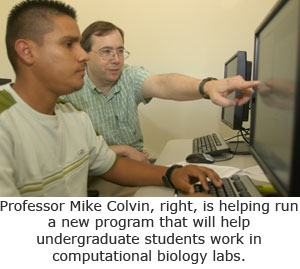

Two dozen UC Merced undergraduates interested in pursuing a career in
computational biologywill be able to do first-hand
researchin that field with the help of a nearly $1 million grant.
School of
Natural SciencesDirector of Student Success Masa Watanabe and Professor
Michael Colvinlast month were awarded $994,999 from the National Science Foundation to support undergraduate research in computational biology. It is the largest award UC Merced has received to support undergraduate research.
The program will engage students in computational biology research projects with the goal of sparking and fostering their interest in scientific careers. This is one of the many opportunities for undergraduates to work side-by-side with the campus’ faculty members. In addition to conducting interdisciplinary research, students will learn about what it’s like to be a researcher by writing proposals and presenting their scientific findings.
“This program gives students a lot of the experiences they might not otherwise get until graduate school,” Colvin noted.
Applications will be accepted later this fall with the first group of students beginning in summer 2011, Watanabe said.
The award will support a total of 24 students. The students will receive classroom and hands-on training in an array of computational biology methods during their first summer with the program. When the semester begins, they’ll begin their lab work with UC Merced’s innovative researchers. Ten faculty members are participating in the program.
Each student researcher will spend two years working in a computational biology lab, which is enough time to understand the computational tools and to also do meaningful research, Colvin explained. They’ll be given $14,000 per year to help with living expenses so they don’t need to work other part-time jobs.
The undergraduate students will be encouraged to take the Graduate Record Examination (GRE) and explore
graduatedegrees. The research program will also include information nights so family members can understand the importance of pursuing doctoral degrees.
Computational biology is focused on quantitative analysis using mathematical modeling, which represents a shift in the way scientists approach biology. Computational biology can be used for basic science, such as studying why some proteins fold and why others do not, and also for practical applications, such as designing better cancer drugs.
“We want to create a foundation of quantitative skills that students can use throughout their careers,” Colvin said.
More details of this program will be available in October at
http://ccb.ucmerced.edu.






